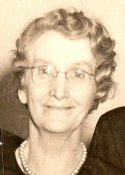
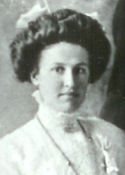 Agnes Malinda Jones Kimber was born on June 3, 1885 in Huntington, Emery County, Utah, the eighth child in a family of thirteen sons and daughters of Elisha Warren Jones and Jane Anne Pierce. She was born on a Sunday at noon, “Aunt” Jane Hill being the midwife. She was the first of the children to be born in Huntington after the family moved there from Heber City, Utah. The move to Huntington had been made by covered wagon in the early spring of that same year, 1885. Her father, Elisha Warren Jones, had been sent to Huntington to set up a school system, and was already there when the rest of the family made the move.
Agnes Malinda Jones Kimber was born on June 3, 1885 in Huntington, Emery County, Utah, the eighth child in a family of thirteen sons and daughters of Elisha Warren Jones and Jane Anne Pierce. She was born on a Sunday at noon, “Aunt” Jane Hill being the midwife. She was the first of the children to be born in Huntington after the family moved there from Heber City, Utah. The move to Huntington had been made by covered wagon in the early spring of that same year, 1885. Her father, Elisha Warren Jones, had been sent to Huntington to set up a school system, and was already there when the rest of the family made the move.
Elisha Warren Jones was born on June 7, 1849 at Kanesville, Pottawattama County, Iowa, the son of Elisha Jones and Margaret Tolbott. His family moved to Heber City, Utah as converts to the Mormon Church. As a young man of sixteen, while working with a logging crew, he suffered an accident which resulted in his entire left side becoming paralyzed and growth on that side was halted. As he matured to adulthood, his left leg was shorter than the right one and his left arm was also shorter than his right one. His face was also somewhat affected. Realizing that the boy would be unable to do hard manual labor, his father educated him to be a school teacher.
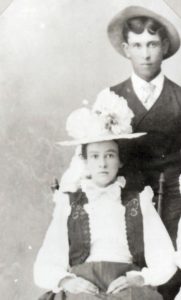
Charles and Lindy Kimber
Jane Anne Pierce was born in Lock Galley, Scotland on November 7, 1854, the daughter of George W. Pierce and Margaret Watson. She and Elisha Warren Jones met in Heber City, and were married in the Old Endowment House in Salt Lake City on March 7, 1871. The couple had seven children when they moved to Huntington in 1885. During the years that followed, Jane often took in boarders for short periods of time and also helped her husband a great deal. For several years he drove the mail from Huntington to Price and was also assessor for Emery County for a number of years.
The family home was a two-storied frame house situated on approximately four acres of land which was well-kept and had plenty of water. The family raised a garden each year and there was a variety of fruit trees on their property. They also had their own bees, the mother assuming full care of them. With chickens and a milk cow and other farm animals, the family was pretty much independent, quite typical of the pioneer society of those times. Malinda, “Lindy” (the name by which she was known during her life time) remembered her childhood home as one where peace, love, and cooperation existed.
Lindy once described herself as being a shy child, and was always fearful of doing something wrong. She did not enjoy school very much and really disliked arithmetic, but quite enjoyed spelling and grammar. When it came time for her to be baptized, she was so frightened that her father allowed her to wait for a while longer, and he finally persuaded her to let him baptize her on August 23, 1894, and she was confirmed the next day, which was a Thursday, when fast meetings were held in those days.
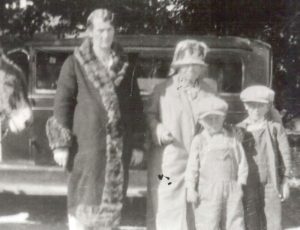
Agnes Malinda Kimber, Elizabeth Kimber Cook, Kay Kimber & Russell Kimber
For quite some time, Lindy’s father had been friendly with Charles Kimber, and when the latter decided to move to Grouse Creek in the northern part of the state, he influenced the Jones family to make the move also. It was a hard move to make, especially for Jane Ann, who did not want to leave Huntington. The move was made in two covered wagons. They started out on Memorial day of 1899, and the trip took about ten days, during which time Lindy had her 14th birthday. With no eggs and no stove, her mother made her a nice birthday cake which was baked over the campfire in a big dutch oven.
Their first home in Grouse Creek was a two-room log house on property belonging to Sam Kimball, which Lindy’s father had leased on shares. As soon as the Jones girls were old enough, they hired out to do housework for some of the other settlers. Lindy worked first for Sam Kimball’s wife, Isadore. She lived with the family and her wages were $1.50 per week.
When his lease was up on the Kimball ranch, her father leased a place on Etna from Moroni Tanner, and at that time, Lindy began working for “Aunt Minie” Kimber on the Kimber ranch which was about twelve miles south of Grouse Creek. Aunt Minie and Uncle Bill and their family lived in a three-room adobe house and a few yards from them lived the Old Grandpa and Grandma Kimber, parents of William and Charles. “Grandpa” Kimber was the bishop of the Grouse Creek Ward for about twenty years. He faithfully traveled the twelve miles to and from church by team and wagon to perform his duties.
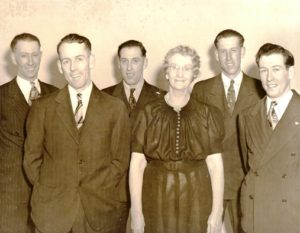
Evan, Eldred, Vaughn, Agnes Malinda, Myron & Russell Kimber
After working for Aunt Minie, Lindy also worked for Tina Morris and a Mrs. Fletcher at Etna, and also for Emmy Catlin and Josie Kimber at Grouse Creek. She first became interested in her future husband, Charles William Kimber, while she was working for “Aunt Josie.” Billy, as he was called, was one of the older children of the first family of Charles Kimber. He was in his early teens when his mother died. Billy would often ride horseback over to the Jones home in Etna to see
Lindy and her mother would then invite him to put his horse in the barn and stay overnight.
Lindy was working for Emmy Catlin just before her marriage to Billy. Emmy was a very good seamstress and consented to make the wedding dress. Lindy sent to Winestock Luben in California for the material. The dress was made of white corded silk and had a flounce around the bottom of the skirt held out with crinoline. It was trimmed with blue ribbon. Lindy paid for the material herself from her wages and also paid Emmy a week’s wages to make it. She also bought all the material for her quilts, which her mother and sisters helped her make.
Billy and Lindy were married by George A. Blanthorn on March 17, 1903 in Kimber’s old log house in Grouse Creek. Aunt Minie and Uncle Bill Kimber were the witnesses. They first lived with her brother, Will Jones in his log home, then with Billy’s family for a while. They later moved to the Buckskin Springs, sharing a house with Quart and Jane Catlin (Jane was Lindy’s sister). It was there that Eldred, their oldest son, was born on January 29, 1904. He was just learning to walk when they moved again to live with her brother, Will Jones. Will helped to get the logs for them to build their own one-room home just a little way above the dugway in Grouse Creek. In another year, they added another room. Vaughn and Evan were both born while they lived there. Vaughn was born on October 28, 1906 and Evan was born on August 14, 1908. This two-roomed log home was later moved a mile or so up the valley to property which they began to purchase from his father with a loan from the Federal Land Bank of Berkeley. The acreage was about sixty-four acres. Billy’s brother Elmer also began purchasing the property to the north of them. Even though the loan payments were small, it was sometimes very difficult for them to meet the due dates.
Lindy’s health was never the best, and having her children was especially hard on her. Most of her babies were quite large at birth, Vaughn weighing twelve and one-half pounds. Her blood condition was poor and she kept losing weight. She finally went to a Dr. Ross Anderson in Salt Lake City who helped her a lot with blood-building medication and other prescriptions which she could refill by sending to ZCMI’s drugstore. She also attributed much to the power of the priesthood and called the elders many times to administer to her.
Evan was five years old when he was severely burned. It happened in January. He was cuddled with his dog, Old Spotty, in the space behind the cook stove. A large container of frozen milk had been placed on the stove to thaw out so that it could be fed to some baby pigs. All at once the milk began to boil and as it was hurriedly lifted off the stove, the bottom of the bucket stuck to the stove and the boiling milk spilled all over Evan and the dog. It was a terrible, traumatic thing to happen.
Evan suffered terribly during the following weeks and months. At times he was unconscious for days at a time. His mother Lindy was at his side constantly, day and night, as one complication after another set in. They decided to take him to Heber City, where Lindy could be with her parents and where Evan could be under a doctor’s care. Dr. Wherritt was kind and considerate and very patient, but it was weeks before they returned home. Many prayers and priesthood administrations helped in Evan’s recovery.
Lindy’s health continued to go downhill, and many times she thought she would never be able to raise her three sons. At one time, Billy wanted to take her to the doctor again, but she refused, telling him that she wanted to go to the temple instead and be sealed as a family. And so they began to prepare to do that.
They finally went to the Logan Temple and were sealed on January 13, 1916, and their three sons were sealed to them. While they were in the temple, she was asked if she would like a blessing and an administration. Of that occasion, she said, “I have lived to receive every blessing that was promised to me. From then on, I began to improve and I can bear testimony that it was through the goodness of the Lord.” Her joy and satisfaction of going to the temple were beyond words.
Their son, Myron, was born a year to the day from the time they had gone through the temple. He was born on January 13, 1917. Evan was then nine years old and they had thought they would not be having any more children. Russell was born four years later on October 27, 1921. For several days after this last son was born, she had the impression that it was a daughter, and when Sister Blanthorn, the midwife realized this, she was afraid to tell her the truth. But Lindy was not at all disturbed to learn that it was another son. She was just thankful that he was well and strong and that both of them were getting along all right.
Lindy was always a very spiritual person, believing implicitly in prayer and the power of the priesthood. As the family battled through one health crisis after another, she called upon the Lord many times for help and for the power to sustain and endure the hardships of life.
She was about thirty-five years old when she started teaching a Sunday School class in Grouse Creek with Jane Paskett and Nora Toyn. James Betteridge was the superintendent at that time. From then on she taught in one class or another and continued to be as active as circumstances would permit. Joseph Barlow was the bishop when she was called to be the Relief Society president, and she served in that position for five or six years.
By 1926 or 1927 it was apparent that Billy’s health problems were such that he required the regular attention of a doctor. They leased out the place in Grouse Creek and moved to Ogden. Dr. Draper had been treating him for arthritis, but many other complications occurred also. Due to pneumonia, and other problems his lungs were in a very serious condition. At one time, he lay semiconscious for nearly three weeks. Eldred and Vaughn were working and some of the livestock on the place at Grouse Creekwere sold and then Evan found work, so that they were able to manage. They lived in the Ogden 13th Ward and made many friends there. Myron and Russell attended the Ogden Schools and also had many friends.
As Billy became stronger, he made several trips back to Grouse Creek, and finally decided to take the place back. Although Lindy would have preferred to remain in Ogden, she consented to return with the two boys, Myron and Russell. The three older boys had married by this time. Eldred married Gwen Holman, Vaughn married Goldie Thorpe, and Evan married Agnes Sterling.
Times were hard back on the place in Grouse Creek. Myron and Russell did most of the work, since their father could not do a lot. Eldred’s boy, Dwaine, would go out in the summer time, also his brother Verl, and sometimes Vaughn’s boy Teddy. Billy’s health went from bad to worse, and he finally became bedridden, his good wife being a constant nurse to him. He finally died on November 16, 1941. His funeral and burial were on November 21, 1941.
After her husband died, meager though her income was, Lindy continued struggling with the payments on the place and was able to eventually pay off the debt. She acknowledged many times that she was able to do this because of her strict observance to the law of tithing, and also gave credit to her son Eldred for his financial help on more than one occasion.
Myron and Russell each served in the U. S. Army during World War II. Myron was drafted but served only six months and did not go overseas. He was given an agricultural discharge because of his father’s health and eventual death. After his marriage to LaVerne Lee, he continued working on the farm and they lived with his mother for several years. Russell, however, who was drafted later, saw service overseas with the 11th Armored Division. His mother spent many anxious days and weeks and months during the time of action which Russell spent in the thick of those awful war areas. When he returned, the two of them continued to live for a short time in Grouse Creek. The farm was then sold and they moved to Ogden and then later moved to Wendover where Russell found employment and where Myron was already established with his family. In Wendover, Russell met and married LuRae Cranney who had come there to teach school.
In 1951, Myron and his family moved to Grantsville, Utah, and about a year later, Lindy decided to also move to Grantsville. She lived in a small but comfortable home on Hale Street, and was quite independent, doing her own housework and most of the yard work. She made many friends wherever she went. Her health continued to decline. She had undergone several major operations, some before and some after her husband died. Her recovery from each of these seemed to never be really complete, but her great faith and the power of the priesthood kept her going.
At Thanksgiving time in 1957, she suffered a stroke while at Eldred’s home in Ogden. As a result, she was left almost totally deaf. Attempts to help her with hearing aids were not successful, and because of this, her church activity became very limited. Often, the sacrament was brought to her home, which pleased her very much. She enjoyed good eyesight, however, and found great pleasure in reading good books. She loved to have people come and visit her, and those who came would find a notebook and pencil within easy reach and would converse with her in that manner, she responding verbally.
While she lived in Grantsville, she expressed a great desire to receive her patriarchal blessing, which she had never yet received. So arrangements were made and she went to the stake patriarch, who at that time was Samuel W. Clark, brother to President J. Rueben Clark Jr. Although she never heard a word that was said during the blessing, she nevertheless felt that the Lord had directed and inspired Patriarch Clark, who, in the course of the blessing, promised her that she would someday hear again. Even though that blessing was not fulfilled before her death, she knew of a surety that at some future date, there would be a literal fulfillment of that and many other blessings.
She steadily declined in health, being unable to eat well because of a stomach problem which the doctors could not seem to correct and also because of other ailments incident to age. In the summer of 1966, she decided to rent an apartment right next to her son Eldred in Ogden. She later underwent another operation, this time for hernia. As her health worsened, a hospital bed for her was put in Eldred’s front room. She died during the early hours of January 14, 1969. Her body was taken to Grouse Creek for the funeral and also for burial beside her husband who had preceded her in death almost twenty-eight years before.
She was a woman of great faith. Many friends have testified as to the effect for good she had on their lives. She had a great desire to be a good example to everyone, especially to her children and grandchildren.
